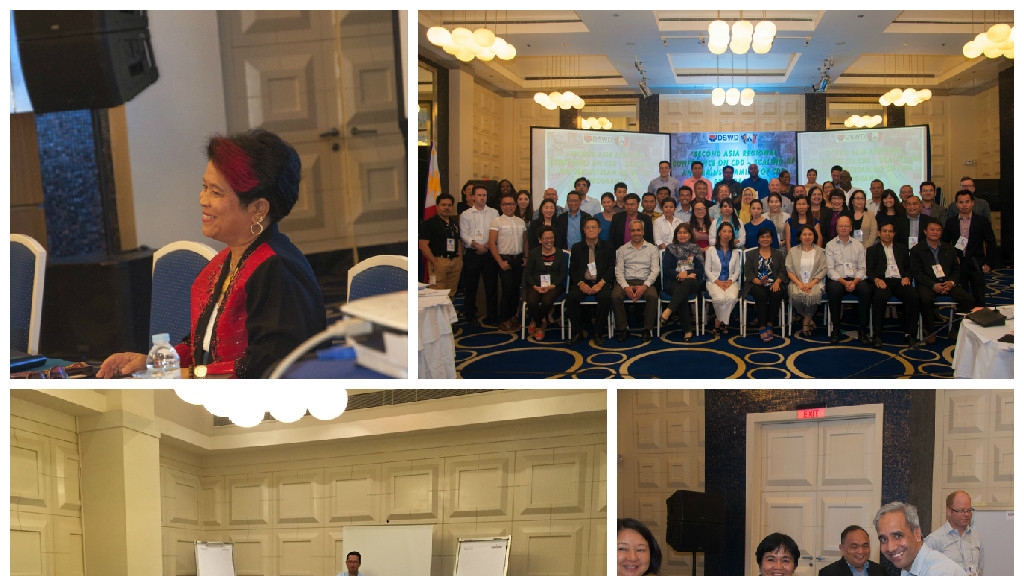OPENING SESSION AND KEY NOTE SPEECHES:
· Key note speech by Secretary Corazon Juliano-Soliman, Department of Social Welfare and Development, the Government of the Philippines
· Opening Remarks by Susan Wong, Global Lead for CDD, World Bank
DAY 1: TAKING CDD TO SCALE: INSTITUTIONAL, SYSTEMS AND SECTORAL CHALLENGES
SESSION 1: Scaling-up CDD: experiences and challenges (Facilitated by Susanne Holste, Lead Social Development Specialist, World Bank)
· “Scaling up CDD Into a National Program: The Philippines’ Experience” by Camilo Gudmalin, Assistant Secretary, Department of Social Welfare and Development, the Philippines
· “National Community-Driven Development Project: Scaling-up CDD: Experiences and Challenges” by Than Naing Win, Assistant Director, Department of Rural Development, Ministry of Livestock, Fisheries and Rural Development, Myanmar
· “Pakistan Poverty Alleviation Fund” by Mohammad Ashraf, Senior Management Executive, Poverty Alleviation Fund, Pakistan
SESSION 2: Sustainability: linking CDD with front line sectoral agencies and basic service delivery (Facilitated by Rob Wrobel, Senior Social Development Specialist, World Bank)
· “Government of Indonesia Policy and Strategy for Improving Basic Services for the Poor and Vulnerable” and Talking Points, by Woro Sri Hastuti Sulistyaningrum, Head of Sub-Directorate of Community Empowerment, National Development Planning Agency, Indonesia
· “Sustainability: Linking CDD with Frontline Sectoral Agencies and basic service Delivery” by Laisa Alamia, Executive Secretary, Office of the Regional Governor, Autonomous Region in Muslim Mindanao, the Philippines
DAY 2: INSTITIONAL AND POLICY CHALLENGES TO OPERATIONALIZING NATIONAL CDD PROGRAMS
· Opening Address by Secretary Abad
SESSION 3: Sustainability Part 2: sub-national structures/ Local government linkages (Facilitated by Raul Gonzalez, CDD Specialist, Asian Development Bank)
· “The Role of CDD and Village Law in Promoting Village Development and Community Empowerment in Indonesia” (and “Fact Sheet”), by Suprayoga Hadi, Acting Director General for Village Development and Community Empowerment, Ministry of Villages, Indonesia
· “Rural Service Delivery and Local Governance Project implementation and considerations for Up-scaling based on the implementation experience in Papua New Guinea” by Joseph Sungi, Vice Minister, Ministry of Inter-Government Relations, Papua New Guinea
· “Kerala Local Government Service Delivery Project”, (also Talking points, and short summary report) by James Verghese, Principal Secretary, Government of Kerala State, India
SESSION 4: Policy Issues and Challenges to Sustaining CDD (Facilitated by: Kathy Richards, First Secretary, Development Cooperation, Government of Australia’s Department of Foreign Affairs and Trade (DFAT))
· “Program Nasional Dezenvolvimento Suku: National Village Development Program: Scaling up and Mainstreaming of CDD Programs” by Rosito Guterres, Head of the Department of Monitoring and Evaluation, PNDS, Timor-Leste
· “Philippines’ National CDD Program and Bottom-up Budgeting” by Patrick Lim, Head of Reforms and Innovation Unit, Office of the Secretary, Department of Budget and Management, the Philippines
· “Regulatory Framework of CDD, Integrated Budget Law and its Approach to the Local Government” by Temuujin Division, Fiscal Policy Department, Ministry of Finance, Mongolia
DAY 3: DEEPENING IMPACTS IN AND UNDERSTANDING FROM THE FIELD
SESSION 5: Improving Impacts; Reaching the Marginalized, the Lagging Regions, or the Pockets of Poverty (Facilitated by: Grant Follett, Assistant Director, Poverty and Social Transfers, DFAT)
· “Vietnam Program 135” by Pham Binh Son, Official of the Coordination Office for Program 135-3, Committee for Ethnic Minorities, Vietnam
· “Community Driven Development in Lao Poverty Reduction Fund” (and a related paper) by Chit Thavisay, Director General, National Committee of Rural Development and Poverty Eradication, Laos
· ”Solomon Islands Rural Development Program” by Andrew Prakash, Director for Economic and Productive Sector Division, Ministry of Development Planning and Aid Coordination, Solomon Islands
· “Thailand Experience at the Village and Sub-district levels in Conflict-Affected Provinces” by Kwanchart Wongsupranan, Deputy Secretary General, Southern Border Provinces Administrative Center, Thailand
After the panel discussion, participants were divided into four groups based on topics of interest previously identified. These were: 1) Capacity; 2) Working with Other Government Agencies; 3) Procurement and Financial Management; and 4) Data and Monitoring.
SESSION 6: Voices from the Field (breakout sessions) (Facilitators: Milo Gudmalin, Chi Redeja, Alex Glova, and Jojo Aquilar, Department of Social Welfare and Development, Government of the Philippines, National CDD Program)
This session included semi-structured small group discussions with CDD program staff, community members, and local government participants of the Philippines National CDD Program (NCDDP). Small groups were organized by: 1) “Area Coordination Teams” who oversee work of the Program at municipal level; 2) Mayors and key local government unit staff most directly involved with the implementation of the NCDDP; 3) community volunteers and beneficiaries who manage project committees at village level and implement sub-project activities.
DAY 4: NEXT STEPS – ACTION PLAN FOR WAY FORWARD
SESSION 7: Next Steps for Regional Community of Practice (Facilitated by Susan Wong, Global Lead for CDD, World Bank)
· “Experience from Vietnam CDD Programs” by Bui Thi Minh Thoa, Team Leader for Capacity Building, Central Highlands Poverty Reduction Project, Ministry of Planning and Investment, Vietnam
· “Impact Evaluations of CDD Operations” by Andrew Beath, Economist, Chief Economist’s Office, EAP, World Bank
· Grant Follet, Assistant Director, Poverty and Social Transfers, DFAT
SESSION 8: Operational Challenges and Opportunities (breakout sessions)
The breakout sessions aimed to discuss key project design and implementation challenges in a smaller group setting, drawing on country experience and focusing discussions on key questions as well as various elements of the cross-country operational challenges. Topics included:
· Community-driven livelihoods Support
· Disaster Response and Community-Resilience
· Operation in Fragile or Conflict-Affected Contexts
Closing Session:
· Closing Remarks by Mr. Ramon Falcon, Chief Economic Development Specialist, Housing and Human Settlement Division, National Economic and Development Authority, the Philippines.
Representative from each country also briefly presented their main lessons learned and suggestions for the next conference.
